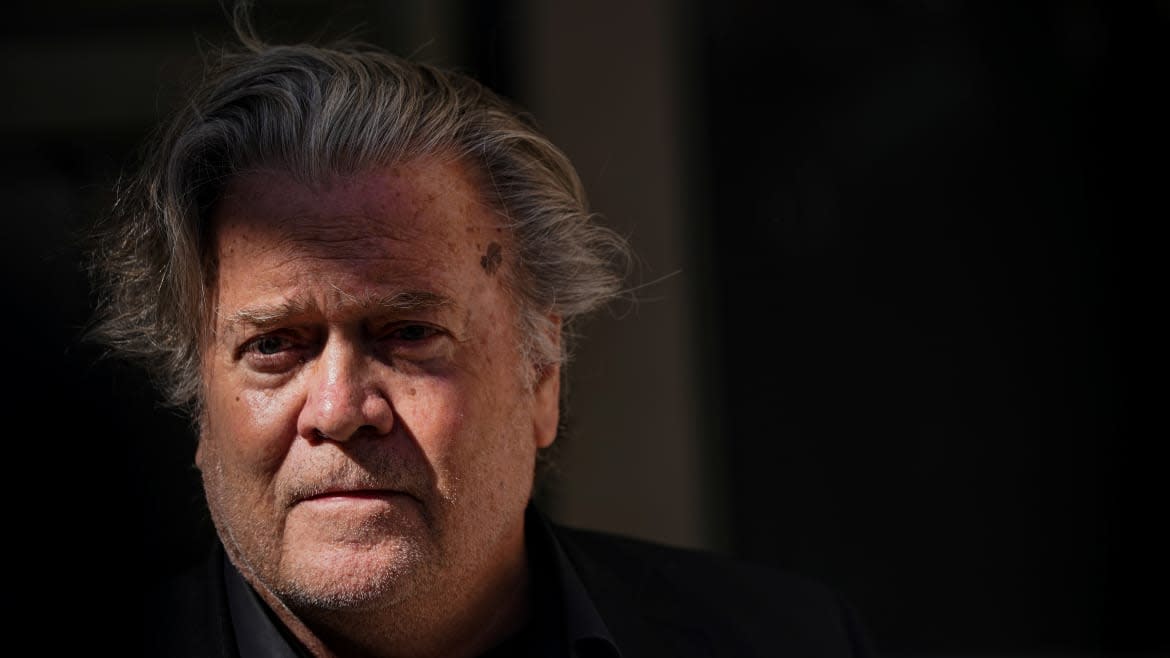Judge Denies Bannon’s Shaky Legal Argument for Executive Privilege

- Oops!Something went wrong.Please try again later.
- Oops!Something went wrong.Please try again later.
A federal judge refused to throw Steve Bannon a lifeline on Wednesday, instead deciding that the right wing provocateur will indeed go to trial in the coming weeks for refusing to testify before the Jan. 6 Committee.
However, the judge indicated he may eventually hold the Department of Justice accountable for spying on one of Bannon's defense lawyers and secretly obtaining his call and email records.
While Bannon’s lawyers insisted that he was protected because of DOJ’s policy that former White House advisers don't have to testify before Congress if a president invokes "executive privilege," U.S. District Judge Carl Nichols on Wednesday was unconvinced that Bannon could point to in noting that "none of these letters unambiguously instructed” Bannon to simply not show up.
“It’s more than a stretch… that they specifically addressed this situation,” Nichols said, noting that Bannon was actually a former White House official—and he was claiming privilege on behalf of Donald Trump when he was no longer the president.
In court on Wednesday, one of Bannon’s defense lawyers disclosed that their client had at least one private conversation with then-President Trump that he wants to keep secret from the Jan. 6 Committee.
That’s one reason Bannon tried to justify his invocation of executive privilege to prevent him from testifying before the panel investigating the Jan. 6 attack on the Capitol.
David Schoen, one of Bannon’s lawyers, who also happened to represent Trump at his second impeachment trial, twice referenced this interaction before a federal judge as the reason why his client should not be prosecuted now for contempt of Congress.
“He’s a former senior adviser who the president then calls in,” Schoen said when describing why the interaction should be barred from congressional inquiry, adding that anyone in Bannon’s position who had previously served in the White House and “was later called in to have a conversation with the president” would not anticipate being prosecuted for keeping that interaction private.
Steve Bannon Digs Into Roger Clemens’ Playbook to Try to Beat Congress
Federal prosecutor Amanda Vaughn said that “cherry-picking” snippets of DOJ memos about executive privilege could not be used as a “free pass to commit crimes” and not show up before Congress.
She said there was no opinion from the DOJ’s Office of Legal Counsel, which designs these sorts of policies, that would say Bannon “didn’t have to turn over documents of his communications with the Proud Boys, or Oath Keepers, or his meetings with members of
Congress on January 5th at the Willard Hotel.”
Bannon’s executive privilege argument rests on a string shaky premises. For one, he’s arguing that executive privilege extends to former presidents. For another, he’s holding that executive privilege extends to him—at the time, a private citizen—because he had interactions with the then-president. And then, finally, as the prosecution pointed out Wednesday, Bannon holds that he has blanket protection from talking to Congress about anything because he had a conversation with the president.
When Bannon refused to testify or hand over documents to the congressional committee investigating the Jan. 6, 2021 insurrection at the Capitol building in October last year, the panel held him in contempt of Congress, and the Department of Justice followed up with a criminal indictment in November. The rightwing provocateur immediately seized it as an opportunity to attack the attorney general, House speaker, and president.
From the start, Bannon said he would turn this into the “misdemeanor from hell for Merrick Garland, Nancy Pelosi, and Joe Biden.” His lawyers developed a legal strategy that would attempt to use the case’s to get any DOJ, Congress, or White House records that would hint at this being merely a political prosecution. And since then, the case has gotten messy.
In February, Bannon’s defense team revealed that the FBI had spied on one of Bannon’s lawyers: Bob Costello of New York. The Daily Beast then exposed that federal agents had actually cast a wide dragnet that surveilled several incorrect Robert Costellos, some of whom live in other states and have never even practiced law. That worried the federal judge overseeing the case, who said he wanted to review the investigative tactics used by the feds.
Get the Daily Beast's biggest scoops and scandals delivered right to your inbox. Sign up now.
Stay informed and gain unlimited access to the Daily Beast's unmatched reporting. Subscribe now.

